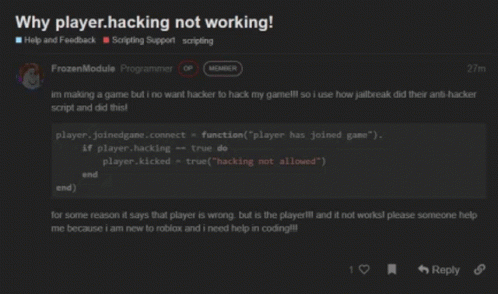Fix My Anti Cheat localscript Testing
-- UTILS
local function toZeroBase(tbl)
local newTbl = {}
for i, v in ipairs(tbl) do
newTbl[i - 1] = v
end
return newTbl
end
local function toOneBase(tbl)
local newTbl = {}
for i, v in pairs(tbl) do
newTbl[i + 1] = v
end
return newTbl
end
local function overflow(n)
local max_uint32 = 4294967295
return ((n % (max_uint32 + 1)) + (max_uint32 + 1)) % (max_uint32 + 1)
end
-- XXTEA IMPLEMENTATION
local DELTA = 0x9E3779B9
local function xxtea_mx(sum, y, z, p, e, k)
local p1 = bit32.bxor(bit32.rshift(z, 5), bit32.lshift(y, 2))
local p2 = bit32.bxor(bit32.rshift(y, 3), bit32.lshift(z, 4))
local p3 = bit32.bxor(sum, y)
local p4 = bit32.bxor(k[bit32.bxor(bit32.band(p, 3), e)], z)
return bit32.bxor(p1 + p2, p3 + p4)
end
-- V: array of numbers - what you want to encrypt
-- K: array of numbers - encryption key
function xxtea_encrypt(v, k)
local v = toZeroBase(v)
local k = toZeroBase(k)
if #k < 2 then
return v
end
local n = #v
if n < 1 then
return v
end
local z = v[n]
local y = 0
local sum = 0
local e = 0
local p = 0
local q = 6 + math.floor(52 / (n + 1))
local run = 0
while true do
if not (q > 0) then break end
q -= 1
run+=1
sum = overflow(sum + DELTA)
e = bit32.band(bit32.rshift(sum, 2), 3)
for i = 0, n - 1 do
p = i
y = v[p + 1]
v[p] = overflow(v[p] + xxtea_mx(sum, y, z, p, e, k))
z = v[p]
end
p += 1
y = v[0]
v[n] = overflow(v[n] + xxtea_mx(sum, y, z, p, e, k))
z = v[n]
end
return toOneBase(v)
end
-- V: arary of numbers - what you want to decrypt
-- K: array of numbers - encryption key
function xxtea_decrypt(v, k)
local v = toZeroBase(v)
local k = toZeroBase(k)
if #k < 2 then
return v
end
local n = #v
local z = 0
local y = v[0]
local sum = 0
local e = 0
local p = 0
local q = 6 + math.floor(52 / (n + 1))
sum = overflow(math.floor(q * DELTA))
while sum ~= 0 do
e = bit32.band(bit32.rshift(sum, 2), 3)
for i = n, 1, -1 do
p = i
z = v[p - 1]
v[p] = overflow(v[p] - xxtea_mx(sum, y, z, p, e, k))
y = v[p]
end
p-=1
z = v[n]
v[0] = overflow(v[0] - xxtea_mx(sum, y, z, p, e, k))
y = v[0]
sum = overflow(sum - DELTA)
end
return toOneBase(v)
end
-- Helper
function string_to_bytes(str)
local byte_table = {}
for i = 1, #str do
byte_table[i] = string.byte(str, i)
end
return byte_table
end
function bytes_to_string(byte_table)
return string.char(table.unpack(byte_table))
end
print("Loading Anti Cheat v1.0")
if not game:IsLoaded() then
game.Loaded:Wait()
end
local data = game.ReplicatedStorage.GetScript:InvokeServer()
local KeyString
game.ReplicatedStorage.Script:GetPropertyChangedSignal("Value"):Connect(function()
print("Getting key")
KeyString = game.ReplicatedStorage.Script.Value
local decrypt_data = xxtea_decrypt(bytes_to_string(data), KeyString)
print(decrypt_data)
end)
``` Im using xxtea luau, i downloaded In https://github.com/GuilhermeBrazilianSamurai/xxtea-luau, localscript didnt print In "print("Getting key")"
